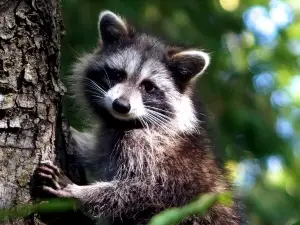
Safflower plants are enjoyed by a wide variety of organisms, humans eat safflower plants and seeds, animals eat these plants’ seeds as well. Humans grow this plant in order to harvest the oil in the seeds and for the seeds themselves.
So how about raccoons? Do raccoons eat safflower seeds? This article looks into it.
Raccoons certainly eat safflower seeds. These animals will raid your bird feeders looking for safflower seeds and will leave no seeds for birds. Nutrients present in these seeds, that raccoons will benefit from, include fats, protein, and carbohydrates to name a few.
Table of Contents
Do raccoons eat safflower seeds?
Raccoons are classified as omnivores, their diet consists of both plant and animal matter. They are also opportunistic feeders, which means that they eat almost anything they can find.
Raccoons eat seeds of all types, including safflower seeds.
Not only are raccoons able to eat safflower seeds, but raccoons love these seeds so much that they will devour all the safflower seeds in your bird feeders leaving none for birds to eat.
Health benefits of raccoons eating safflower seeds:
Safflower seeds, when eaten, deliver good amounts of fat, carbohydrates, and protein to raccoons. These seeds are made up of 38% fat, 34% carbohydrates, and 16% protein.
Protein is needed for cell regeneration in raccoons as well as for the development of body tissue. Carbohydrates serve as an energy source for raccoons. The fats in these seeds will help the raccoon’s body absorb fat-soluble vitamins.
These seeds also contain a number of other vitamins and minerals that can benefit raccoons, namely: vitamin C, niacin, potassium, vitamin A, riboflavin, and vitamin B6.
Raccoon design and safflower seeds;
Safflower seeds are larger than popcorn kernels but smaller than black oil sunflower seeds, they are also quite hard. Nevertheless, raccoons will have no problem eating these seeds, the animal’s teeth will simply crush these seeds and their strong stomach acids will digest them
Seeds, and other plant matter, are enjoyed by raccoons because they are relatively easy to acquire.
Raccoons are lazy omnivores, they prefer to conserve energy when looking for food. Chasing and killing prey is more energy-intensive than finding and eating safflower seeds, raccoons would rather find and eat safflower seeds.
What animals eat safflower seeds?
Mammals:
Mammals that enjoy eating plants will happily eat safflower seeds. Animals that eat these seeds include rodents and opossums. Interestingly enough, squirrels do not eat these seeds.
Birds:
Safflower seeds have thick shells, birds that are able to open safflower seeds will be able to enjoy them. Birds that are able to eat these seeds include sparrows, doves, cardinals, chickadees, and grosbeaks.
Safflower seeds are so widely enjoyed by birds that many bird feeds include this seed.
Insects:
Insects enjoy safflower plants. Insects enjoy these plants so much that they can eat and end up damaging the plant. Insects eat various parts of the plant.
Wireworms, grasshoppers, cutworms, aphids, and sunflower moths are insects that will eat at, and even damage, this plant.
Humans:
Humans love safflowers, in fact, we are one of the biggest consumers of this plant.
This plant is very versatile to humans as the oil can be used to cook with, the seeds can be added to trail mixes and if you don’t want to use saffron, you can use safflowers as a substitute for saffron.
This plant is used in culinary dishes as well as medical treatments
What attracts raccoons to your yard?
Animals enter your yard looking for one of three things, they are either looking for food, water, or shelter. Raccoons will enter your yard looking for the same things:
Shelter:
Your home and garden likely have many spots where raccoons can call home. Spots like your attic, doghouses, sheds, and garages can act as raccoon homes as long as the animals are not being disturbed.
Food:
Raccoons eat a variety of different foods, even foods that many humans would consider to be unsavory. Raccoons can find food in garden beds, trash cans, bird feeders, fish ponds, and fruit trees,
Water:
Raccoons love water, they sometimes create homes near water bodies in order to be close to water. They enjoy swimming in water and catching and eating marine life.
Conclusion
In conclusion, yes raccoons eat safflower seeds.
These seeds are delicious to raccoons, are easier to acquire than live prey, and are a great source of nutrients like carbohydrates, fats, proteins, vitamin C, niacin, potassium, vitamin A, riboflavin, and vitamin B6
If you enjoyed this article then you may also be interested in other raccoon related articles. Here are some articles that you may be interested in: Do raccoons eat ducks?, Do raccoons eat duck eggs?, Do raccoons eat thistle seeds?, Do raccoons eat nyjer seed?

